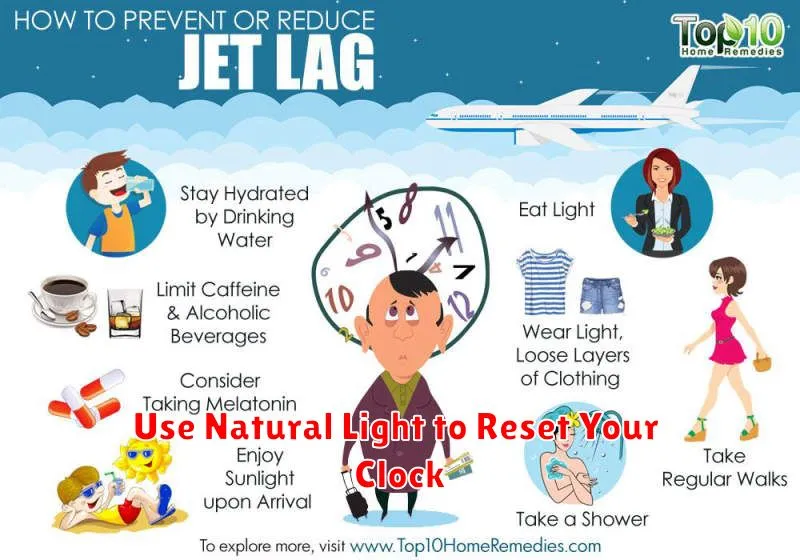International travel can be an exciting experience, but the dreaded jet lag can quickly put a damper on your adventures. Jet lag, formally known as desynchronosis, is a temporary sleep disorder that occurs when your body’s internal clock is disrupted by crossing multiple time zones. Symptoms can range from mild fatigue and difficulty concentrating to more severe issues like insomnia, digestive problems, and mood swings. Learning how to effectively manage jet lag is essential for maximizing your enjoyment and productivity during international trips. Whether you are a seasoned traveler or embarking on your first international trip, this article will provide practical strategies to minimize the effects of jet lag and allow you to quickly acclimate to your new time zone.
This comprehensive guide explores proven methods for managing jet lag during international trips, encompassing pre-trip planning, in-flight strategies, and post-arrival adjustments. Discover how to prepare your body for the time change before you even leave home, including tips on adjusting your sleep schedule and diet. Learn valuable in-flight techniques for minimizing discomfort and promoting rest during your international trip. Finally, explore effective strategies for quickly adapting to your destination’s time zone upon arrival, ensuring you can hit the ground running and make the most of your international travel experience. By implementing these techniques, you can conquer jet lag and embrace your international trips with renewed vigor and enthusiasm.
What Causes Jet Lag and Its Effects
Jet lag, formally known as desynchronosis, arises from the rapid traversal across multiple time zones. This disrupts the body’s natural circadian rhythm, a roughly 24-hour internal clock regulating various bodily functions, including sleep-wake cycles, hormone release, and digestion.
Crossing time zones essentially throws this internal clock out of sync with the external environment. The body’s internal clock attempts to adjust, but this process takes time. The more time zones crossed, the more pronounced the jet lag symptoms typically become.
Common effects of jet lag include sleep disturbances such as insomnia and excessive daytime sleepiness. Other symptoms can include fatigue, difficulty concentrating, irritability, gastrointestinal issues, and a general feeling of malaise. The severity and duration of these symptoms vary depending on the individual, the number of time zones crossed, and the direction of travel (eastward travel generally causes more severe jet lag than westward travel).
Adjusting Sleep Before Your Trip
One of the most effective ways to minimize jet lag is to gradually adjust your sleep schedule before you depart. This helps shift your body clock closer to the time zone of your destination, lessening the shock of a sudden change. The direction you’re traveling dictates how you should adjust your sleep.
For eastward travel, try going to bed and waking up earlier in the days leading up to your trip. Even shifting by 15-30 minutes each day can make a difference. For westward travel, do the opposite – delay your bedtime and wake-up time progressively.
The amount of adjustment you need depends on the number of time zones you’re crossing. A larger time difference requires a more substantial shift in your sleep schedule. While perfect synchronization is rarely achievable, even a partial adjustment significantly eases the transition. Consult a sleep specialist for personalized advice, especially if you have pre-existing sleep disorders.
Stay Hydrated and Avoid Caffeine

Staying properly hydrated is crucial for combating jet lag. Dehydration exacerbates jet lag symptoms, leaving you feeling even more fatigued and sluggish. Aim to drink plenty of water throughout your flight and upon arrival at your destination.
Avoid caffeinated beverages like coffee, tea, and soda, especially close to bedtime in your new time zone. Caffeine can disrupt your sleep patterns and make it harder to adjust to the new time zone. While it might seem tempting to use caffeine to combat fatigue, it can actually hinder your body’s natural adjustment process.
Choose decaffeinated options or herbal teas instead. Consider bringing electrolyte tablets or powders to add to your water to help replenish electrolytes lost during travel. Staying hydrated helps regulate your body’s natural functions and can improve your overall well-being during your trip.
Use Natural Light to Reset Your Clock

Exposure to natural light is crucial for regulating your circadian rhythm, the internal biological clock that governs your sleep-wake cycle. When you travel across time zones, your circadian rhythm becomes misaligned with the local time, leading to jet lag. Sunlight acts as a powerful cue to reset this internal clock, helping your body adjust to the new time zone more quickly.
Upon arrival at your destination, make an effort to spend time outdoors, especially during daylight hours. Morning light is particularly effective in shifting your circadian rhythm forward, helping you adjust to an earlier time zone. Conversely, exposure to evening light can help delay your sleep phase when traveling westward.
Avoid bright artificial light, particularly from electronic devices, in the hours before bedtime. This type of light can suppress melatonin production, a hormone that regulates sleep, making it harder to fall asleep and further exacerbating jet lag.
Avoid Naps That Disrupt Adjustment
Strategic napping can be helpful for combating jet lag, but long or poorly timed naps can actually worsen your symptoms and prolong adjustment. Resist the urge to take a long nap upon arrival at your destination, especially if it’s daytime. This can make it harder to fall asleep at the appropriate local time, further disrupting your body clock.
If you absolutely must nap, keep it short – no more than 20-30 minutes. A short “power nap” can provide a boost in alertness without significantly impacting your nighttime sleep. Set an alarm to avoid oversleeping. Be mindful of the timing of your nap. Napping too late in the day can interfere with falling asleep at night.
Consider the local time and your intended bedtime when deciding whether or not to nap. If you arrive in the late afternoon or early evening, it’s generally best to avoid napping and try to stay awake until your regular bedtime in the new time zone. This will help your body adjust more quickly.
Consider Melatonin or Other Aids
If natural methods prove insufficient, consider using melatonin supplements. Melatonin is a hormone that regulates sleep-wake cycles. Taking a small dose of melatonin close to the local bedtime at your destination can help adjust your body clock. Consult with your physician regarding the appropriate dosage and timing for your specific situation. Do not self-medicate.
Beyond melatonin, other sleep aids may be available. However, exercise caution. Some sleep medications can have side effects such as drowsiness or disorientation, which can worsen jet lag symptoms. Discuss any over-the-counter or prescription sleep aids with your doctor before traveling to ensure they are safe and appropriate for you.
Important Note: Prioritize adapting to your new time zone naturally. Sleep aids should be a temporary solution, not a long-term strategy for managing jet lag.
Give Yourself Time to Recover
Jet lag recovery isn’t instantaneous. Your body needs time to adjust to the new time zone. Plan your trip with this in mind. Don’t schedule important meetings or strenuous activities immediately upon arrival.
A general rule of thumb is that it takes roughly one day per time zone crossed to fully recover. However, this can vary depending on the individual. Some people adapt more quickly, while others may require more time. Factor this into your itinerary, especially if traveling eastward, which is often perceived as more challenging for the body’s internal clock.
Allow yourself a buffer period to rest and acclimatize before diving into a busy schedule. Even if you feel relatively okay upon arrival, give your body the opportunity to catch up. This will help minimize the negative effects of jet lag and allow you to enjoy your trip to the fullest.

